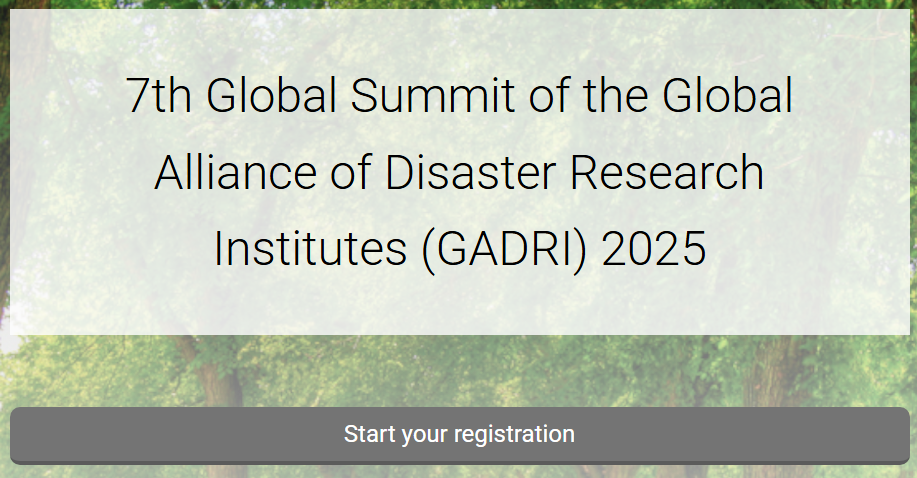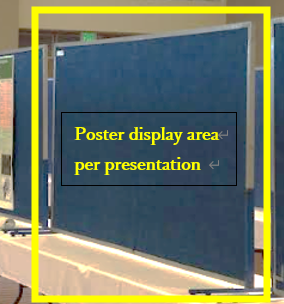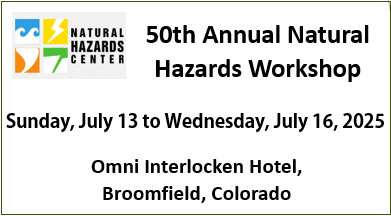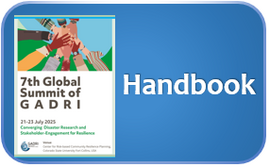The 7th Global Summit of GADRI will give an opportunity for participants to participate in its poster session.
For Applicants for poster presentation:
The 7th Global Summit of GADRI will give an opportunity for participants to participate in its poster session.
For Applicants for poster presentation:
Detail of the space for putting up your poster:
Wide: 8ft(243cm) * Height: 4ft(121cm)
[poster display area]
Please print out the poster on your own and bring it with you.
Please check your Presentation Number below table.
<Details regarding the poster display locations and times will be provided on this page as soon as they are finalized.>
- I-A - Priority Area I: Understanding disaster risk
- I-B - Priority Area 2: Strengthening disaster risk governance to manage disaster risk.
- I-C - Priority Area 3: Investing in disaster risk reduction for resilience.
- I-D - Priority Area 4: Enhancing disaster preparedness for effective response and to “Build Back Better” in recovery, rehabilitation and reconstruction
- II-A - Convergence approaches in research and implementation,
- II-B - Focus on engagement, partnerships, communication, and resulting policies
- II-C - Underscoring the need for fundamental research and focuses on advances in disciplinary and transdisciplinary research
| No. | Title | Presenter | Affiliation | *Related themes |
| P01 | Bridging Qualitative and Quantitative Disaster Risk Reduction Assessments: Developing a Weighted Comparison Matrix for the Sendai Framework | Freeda Jane Madius | Disaster Prevention Research Institute (DPRI), Kyoto University | I-A, I-B, II-A, II-C |
| P02 | The Russia-Ukraine Conflict: A Global Impact Assessment in the Corn and Wheat Sectors | Nkongho Ayuketang Arreyndip | Department of Environmental Sciences, Informatics, and Statistics, Ca’ Foscari University of Venice, Venice, Italy | I-A, I-B, I-D , II-C |
| P03 | Institutionalizing Disaster Risk Reduction in Africa: Traditional Knowledge and Traditional Leaders' Role | Julia Choolwe Munsaka | Colorado State University, Department of Political Science | I-B. |
| P04 | Pathway towards building community Resilience in the Coastal zone of the Ganges-Brahmaputra-Meghna Delta in Bangladesh | Md. Munsur Rahman | Anisul Haque, Rayhanur Rahman | I-A, I-C, I-D |
| P05 | Louisiana Disaster Reduction Initiative: Advancing Disaster Resilience through Innovation | Rubayet Bin Mostafiz | LaHouse Research and Education Center, LSU AgCenter | I-A, I-B, I-C, I-D , II-A, II-B |
| P06 | Neural basis of emotion for enhancing flood mitigation intention through virtual flood experience | Toshio Fujimi | Kyoto University | I-C. |
| P07 | Analyzing Managed Retreat Needs and Constraints: Insights from Historical MR Programs and FEMA Datasets | Muhammad Sajjad Rashid | Civil, Environmental & Architectural Engineering, University of Kansas | I-B, II-B |
| P08 | Climate Adaptation Matrix (CAM) for Long-Term Community Resilience Planning | Jiate Li | Colorado State University | I-B, II-B |
| P09 | Strengthening disaster risk management strategies through comprehensive understanding of high-speed dynamic phenomena | Malte von Ramin | Fraunhofer Institute for High-Speed Dynamics, Ernst-Mach-Institut, EMI | I-A |
| P10 | Resilience Assessment of Buildings Against Extreme Weather Events | Malte von Ramin | Fraunhofer Institute for High-Speed Dynamics, Ernst-Mach-Institut, EMI | I-A, I-D |
| P11 | Post-Seismic Reconstruction in Le Teil: Progress Since the November 11, 2019 Earthquake and Focus on Building Rehabilitation | Konstantinos Trevlopoulos | BRGM - French Geological Survey | I-D |
| P12 | Developing Damage State-Dependent Fragility Models for Reinforced Concrete Buildings Under Flood and Seismic Hazards | Konstantinos Trevlopoulos | BRGM - French Geological Survey | II-C |
| P13 | Establishing a Global Research Hub for Comparative Earthquake and Tsunami Disaster Science: Kyoto University On-Site Laboratory “International Research Laboratory for Earthquake and Tsunami Risk Cognition and Reduction (iLETs)” | Yoshihiro Ito | Disaster Prevention Research Institute, Kyoto University | II-A, |
| P14 | Advancing Resilience-Based Design: Insights from Full-Scale Testing of Tall and Midrise Mass Timber Buildings | Prashanna Mishra | Department of Civil and Environmental Engineering, Colorado State University | I-C. |
| P15 | Lifecycle Benefit-Cost Analysis of Wood-frame Residential Buildings to Tornado Hazard | Afeez Badmus | Department of Civil, Environmental and Architecture and Engineering, University of Kansas | I-A, I-B, I-C. |
| P16 | Tornado Sheltering Behavior and Access in Urban and Rural Communities | Saba Faghirnejad | Civil, Environmental & Architectural Engineering, University of Kansas | I-A, I-B, I-C. |
| P17 | Urban Adaptation and Alert Solutions for a TIMEly (re)Action - RETIME project initial results | Katarína Hollá | University of Zilina, Kajoservices, ISCTE | I-A |
| P18 | Development and Application of a Framework for Assessing Effectiveness of EWS for Flood Resiliency: Comparative Analysis and Solutions for Marikina and Pasig Cities, Philippines | Tabassam Raza | Planning and Development Resaerc Foundation Inc. (PLANADES) | I-A, I-B, II-A, II-B, II-C |
| P19 | Probabilistic Multi-Scale Hurricane Surge Loss Mapping to Support Resilience Strategies in Coastal Communities | Mohamad Habibniaykoochesfahani | Colorado State University | I-A, I-B. |
| P20 | Estimation of Dimensionless Bottom Shear Stress in Tsunami by Model Experiments | Michio Sanjou | Disaster Prevention Research Institute, Kyoto University | I-A |
| P21 | Integrating Local Knowledge and Environmental Simulation in Post-Disaster Recovery: A Convergent Framework for Vernacular Settlements | Qiushan Li | Sichuan University–The Hong Kong Polytechnic University Institute for Disaster Management and Reconstruction, Sichuan University, Chengdu, China | I-B, I-D , II-B |
| P22 | Preparedness for Build Back Better - Modeling of Recovery scenarios simulation - | Kenji KOSHIYAMA | Kansai University | I-D, II-C |
| P23 | Development of Business Continuity Planning System Using Recovery Process Estimation from Survey Data | Yota HIRONO | Disaster Prevention Research Institute, Kyoto University | I-B, I-C, I-D , II-A, II-C |
| P24 | Dauphin Island Testbed for Multi-Hazard Risk Assessment and Loss Analysis | Cuong Pham | Department of Civil, Coastal and Environmental Engineering, University of of South Alabama | I-A, I-C. |
| P25 | CIGIDEN Disaster Repository: A Collaborative Platform for Memory Preservation | Rodrigo Cienfuegos | Research Centre for Integrated Disaster Risk Management (CIGIDEN) |
Poster Session :
- Indicate institute’s research activities/achievements/implementations in support of the Sendai Framework Priority Areas.
- Young scientists are also welcome to submit an outline/abstract of the posters along the lines of the proposed conference themes/panel group discussion sessions.
- The poster should be along the same guidelines of the “Registration for Poster Presentation” below.
Registration for Poster Presentation :
- Those who are planning to present, need to register for the summit; and the poster presentation session by 28 February 2025. The registration links are listed below.
- Abstracts should be between 200 to 300 words.
- The summit accepts maximum of two abstract submissions per person.
・Registration form for 7th Global Summit of GADRI:
・Registration form for Poster Presentation – 7th Global Summit of GADRI:
- Deadline for the submission is
28th February 2025.The deadline has been extended to March 31th. - https://forms.gle/qUiMwAW33wYxYGaV7
If you cannot access the above link, please inform the GADRI Secretariat using the following e-mail - poster-7thgs@dpri.kyoto-u.ac.jp by 28 February 31th March 2025.
General guidelines for poster presentation:
- All posters are along the lines of the proposed conference theme and panel discussion topics of the 7th Global Summit of GADRI.
- All contributions are relevant to policy makers and directed towards global disaster risk assessment – not only hazards – dimensions to assess the risks.
- Posters should contribute to the targets of the Science and Technology Roadmap for the implementation of the priority areas of the Sendai Framework Agenda; and/or the COP agenda. Make sure to indicate the Sendai Framework Priority Area/s related to your research work.
- Posters could be reporting on research challenges, contributions, achievements, etc. It is important to framework the data in terms of - whether it is global, national, or local. These dimensions are important.
- With hazards, it is important to mention whether it is technological, natural or others aspects, is it on exposure, or vulnerability, or hazards. This will be a good way to summarize the current status of science and research targets.
- Selected abstracts will have the opportunity to publish the paper in the Proceedings of the 7th Global Summit of GADRI.
- Please use the Springer house styles for preparing the abstract and the full paper - https://www.springer.com/gp/authors-editors/book-authors-editors/your-publication-journey/manuscript-preparation
Themes of the Panel Group Discussion Sessions:
Panel Discussion Session I Progress and challenges for the final five years of implementation of the Sendai Framework in several or more countries
(Participants are required to select a panel discussion session.)
I-A - Priority Area I: Understanding disaster risk,
I-B - Priority Area 2: Strengthening disaster risk governance to manage disaster risk.
I-C - Priority Area 3: Investing in disaster risk reduction for resilience. ,
I-D - Priority 4: Enhancing disaster preparedness for effective response and to “Build Back Better” in recovery, rehabilitation and reconstruction
Panel Discussion Session II: Understanding and improving the relationship between science and technology, policy, and community in the context of the elements of the UNDRR Sendai Framework for Disaster Risk Reduction and the UNCC Paris Agreement, with both at their approximate midpoints.
II-A - Convergence approaches in research and implementation,
II-B - Focus on engagement, partnerships, communication, and resulting policies
II-C - Underscoring the need for fundamental research and focuses on advances in disciplinary and transdisciplinary research
Abstract Submission instructions:
Use the link to finish registration for poster presentation:
- https://forms.gle/qUiMwAW33wYxYGaV7
-
If you cannot access the above link, please inform the GADRI Secretariat using the following e-mail - poster-7thgs@dpri.kyoto-u.ac.jp by
28 February31th March 2025.- When inputting your name in the Registration form, please use your full name as the file name.
- Clearly indicate the Sendai Framework Priority Area/s and whether your presentation is reflecting your institute’s research activities/achievements along the same lines.
- At the 7th Global Summit registration form, please register with the same name used for the poster registration.
- Registration form for 7th Global Summit of GADRI:
- https://gadri.net/summit/registration0/registration/

- Celebration of the 10th Anniversary of GADRI on 20 July 2025
- 7th Global Summit of GADRI from 21 to 23 July 2025








